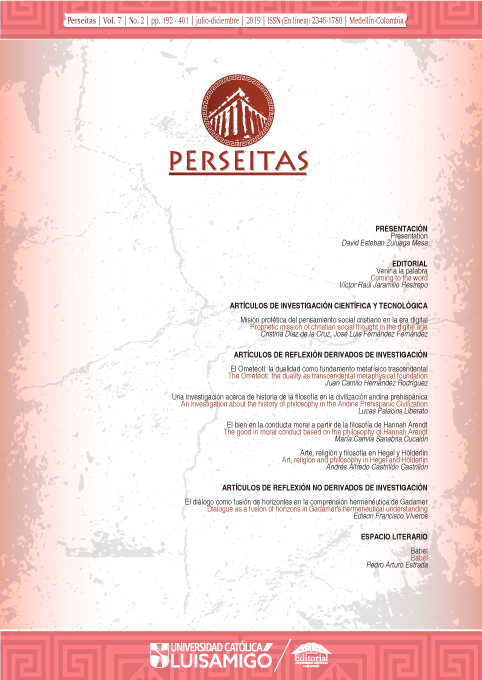The good in moral conduct based on the philosophy of Hannah Arendt
DOI:
https://doi.org/10.21501/23461780.3292Keywords:
Banality of evil, Moral conduct, Coherence, the Good, Hannah ArendtAbstract
In this article we deal with the meaning of good in the framework of Hannah
Arendt’s moral conduct. We will start from her notion of banality of evil and her
anthropological conception of two-in-one to understand the characteristics of
moral behavior. Later we will recognize the negative elements that it constitute,
by avoiding evil from coherence. Finally, we will deal with the meaning of good in
such conduct by concluding that the latter–in an “authentic” sense–would not be
part of it, but could share the characteristics of the banality of evil.
Downloads
References
Arendt, H. (2002). La vida del espíritu, Barcelona, España: Paidós.
Arendt, H. (2007). Responsabilidad y juicio. Barcelona, España: Paidós.
Bernstein, R.J. (1996). ¿Cambió Hannah Arendt de opinión? Del mal radical a la banalidad del mal. En F. Birulés. (Ed.) Hannah Arendt: El orgullo del pensar (pp. 235-257). Barcelona, España: Gedisa.
Botero, A.J. y Leal, Y. (2013). El mal radical y la banalidad del mal: las dos caras del horror de los regímenes totalitarios desde la perspectiva de Hannah Arendt. Universitas Philosophica, 30 (60), 99-126. Recuperado de http://www.scielo.org.co/pdf/unph/v30n60/v30n60a05.pdf
Camps, V. (2006). La moral como integridad. En M. Cruz. (Ed.) El siglo de Hannah Arendt (pp. 63-86). Barcelona, España: Paidós.
Downloads
Published
How to Cite
Issue
Section
License
Copyright (c) 2019 Perseitas

This work is licensed under a Creative Commons Attribution-NonCommercial-NoDerivatives 4.0 International License.
La revista y los textos individuales que en esta se divulgan están protegidos por las leyes de copyright y por los términos y condiciones de la Licencia Creative Commons Atribución-No Comercial-Sin Derivar 4.0 Internacional.
















